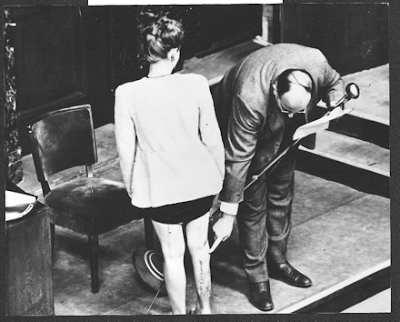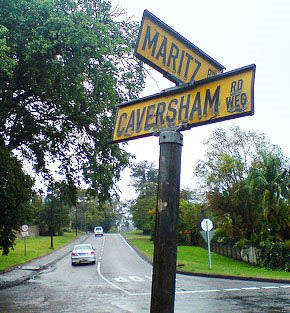
What was the point of fighting the Nazis?
The thought had occurs to me many times, especially on the countless occasions I have heard WW2 described as the "Last good War". You had the Nuremberg Trials, where all those nasty people like Herman Goering were called to account for their sins against humanity. Obviously there were problems about what you were going to charge them with. The British, Belgians and Dutch could accuse them of wanting to build a huge empire, the Americans could accuse them of blatant racism, the French could accuse them of Antisemitism (and building a huge empire), the Russians could accuse them of running torture chambers and concentration camps.
It was not just the big fish like senior politicians and generals who were dragged into the dock. Little people like doctors who practiced euthanasia found themselves in court, even though they could truly protest that they were not "obeying orders"... they were acting voluntarily to relieve suffering. And people like the medical experimenters in concentration camps were held up to public condemnation as obviously the vilest of the vile.
Unfortunately the message did not get through to numerous British and American doctors. Vulnerable people have always been at the mercy of the medical profession. George Orwell, writing in the 1930s, referred to "a sinister minority of doctors whose motives are suspect". In a grim Paris hospital around 1929, he had seen two doctors almost kill a poor patient in a mischievous experiment which they probably would not have dared to try on a wealthy client with influential friends. After the Nuremberg trials, you might have thought that even the doctors would have learnt their lesson.
But, only a few years after Nuremberg, British doctors were experimenting on military personnel.

In the 1950s, they tested poison gas on soldiers at the Porton Down research laboratories. This is one of the most sinister places in England. Set in lovely countryside, only a short drive from the magnificent Salisbury Cathedral, it is the centre for research into chemical and biological weapons. Of course, the experiments went too far, as they always do, and they killed at least one soldier and maimed several others. One writer found at least 300 experiments on humans in the 1950s and 1960s by trawling through the British and American scientific literature. And these were obviously only the results which were published, albeit in the specialist pages of the medical reviews which few non-medical people ever read. The ones where they killed or maimed too many of their victims would be suppressed or circulated only in discreet home-produced documents. Obvious experimental subjects were people in asylums, old people's homes or orphanages, with no concerned relatives outside to defend them. Prisoners and military personnel under strict discipline were also good material.
The Nazis are slowly sliding into forgotten history, despite the best efforts of the movie makers and British tabloids. One widely traveled German friend commented to me that she had never visited any country which had such an obsession with WW2 as Britain....not even France, which was occupied for four years.

But it is obviously the wrong lessons which are being remembered. How else do you explain any person in public life daring to suggest killing the most helpless members of society? And this was not a Nazi nutcase. It was Lady Warnock (pictured with Geoffrey), one of our most influential ethical pundits and a long time participant in any number of public enquiries and commissions into medical issues. In a recent article she stated:
"If you're demented, you're wasting people's lives – your family's lives – and you're wasting the resources of the National Health Service".
This must be the first time I have heard a yearly budget of £75 billion ($140 billion) described as "very limited", though I suppose it is by Government standards. When there are more urgent needs, like pissing $35 billion down the toilet on a useless computer system for the NHS and paying doctors enough to buy new Audis (see the ludicrous Michael Moore's "Sicko"), I suppose elderly people count for very little.
Lady Warnock's Article (
A Duty to Die?) was at least a useful corrective to Moore's typically fatuous documentary, which seemed to imply that the British NHS treated any sick person immediately for free. Of course, this has never been the case. Any number of people have been denied treatment that would prolong or improve their lives because it was not available on the NHS. I have lost count of the number of appeals for various people who need £x thousand pounds to go abroad (usually to the reviled and overpaid US doctors) for treatment which is unavailable in Britain. With the opening up of the East European economies, medical care is available in Budapest and other cities for a fraction of the price British private doctors charge. And even when "free" care is available on the NHS, it is seriously deficient compared with the best available. So even though artificial limbs are provided on the NHS, some patients go to private companies which provide more comfortable or more functional alternatives, even for thousands of pounds a time. Talk about costing an arm and a leg......
But enough of my rantings... Read Melanie Phillips' hatchet job below.
September 22, 2008
The Dehumanised Landscape of Planet Warnock
Daily Mail, 21 September 2008
Has there ever been anyone who has displayed more inhumanity towards her fellow human beings, and yet had more influence over British society, than the noble Baroness Warnock?
In an article for a church magazine, Lady Warnock has declared that elderly people with dementia are ‘wasting’ the lives of those who care for them, and have a duty to die in order to stop being a burden to others.
On pitiless Planet Warnock, people are valued in proportion to their ability to lead an independent life. If they can’t do so, they are to be written off as valueless — and even more nauseating, they are being told they actually have a duty to end their lives.
The elderly and chronically sick - — indeed, anyone who constantly depends on others for care — often dread being a burden on their nearest and dearest. To be told that they must end this burden by finishing themselves off can only increase their guilt, despair and suffering.
On Planet Warnock, it seems that ties of family and kinship, acts of selfless love, the deep satisfaction from bringing comfort to those who are helpless or who are so poignantly leaving us — essential aspects of our common humanity — mean nothing at all.
To be sure, those who are forced to watch a spouse or close relative descend into dementia often suffer immeasurably from this tragic process. All the more reason, therefore, for protecting those who have lost their minds from any pressure from relatives to end their lives, and not — as Lady Warnock is doing — adding to that pressure still further.
Sufferers and relatives should be helped through the provision of better treatments and improvements in care. To say that the demented should instead end their lives shows a quite chilling absence of elementary human sympathy.
And just how does she propose such people should bring this about? She is, after all, talking about people who have lost their minds. How can people who are mentally incapable possibly be expected to take such a decision?
Does she mean they should take it their minds have disintegrated — in which case, their quality of life will still be good and the pressure on relatives will be relatively light? Should their ‘duty’ to die perhaps kick in the very moment they receive the diagnosis of dementia?
Or does she mean that all of us should sign living wills instructing doctors to end our lives if we should ever suffer from dementia in the future — without knowing whether we would be a burden on anyone at all, or indeed whether, if such a disease did strike us down, we would still rather like to continue to live, thanks very much?
One gets the feeling that such practicalities don’t matter much to Lady Warnock. What drives her is simply the belief that lives which she considers to be worthless should be ended. Down this particular road, of course, lie the historic spectres of eugenics, the concentration camp and the gulag.
Tempting though it may be, it would be a mistake to treat this elderly philosopher as an eccentric who can be safely ignored. Lady Warnock is a key figure in the development of medical ethics in this country, from research on embryos to the debates over euthanasia.
Although the days when governments called upon her to serve on such committees of the great and the good may be over, her thinking provides graphic evidence of the slippery slope down which we are sliding at terrifying speed.
What she originally presented as the ‘right to die’, for example, soon mutated into the ‘duty to die’. The claim that euthanasia would benefit sick people by ending their pain is thus revealed as a fraud. The real point is to benefit the sick person’s relatives, in whose interests the patient must be expected to forfeit life itself.
For the ‘right to die’, therefore, read instead ‘no right to live’.
The impulse to end lives considered to be worthless is sliding from cases involving people in an irreversible coma to people who still have their senses, but have lost the power of rational thought.
The watershed was the Law Lords’ judgment in 1993 that allowed doctors to withdraw feeding and hydration from Anthony Bland, the Hillsborough victim who had been left in a persistent vegetative state.
Subsequently, the Mental Capacity Act, which came into force last year in the face of huge disquiet and after a fudged to die’ is a ‘wholly bogus distinction’.
It is a view she carried into practice when she watched her incurably ill husband, Geoffrey, accept the help of a family doctor to take lethal doses of morphine in order to end his life.
This is because Lady Warnock’s thinking follows the ‘consequentialist’ doctrine which looks at the result of an action, regardless of its motive. Hence, she sees no distinction between a drug administered to alleviate a dying patient’s suffering that ends up hastening that person’s death, and a drug deliberately given to bring about death.
But intention is the essence of morality. It means the difference between murder and manslaughter; between an attack and an accident; between killing and allowing someone to die.
Consequentialists similarly think there is no intrinsic value in a human life; the only value lies in the quality of the life that is being lived. That’s why Lady Warnock thinks that if people have lost their faculties, they should forfeit their existence to benefit others whose lives are — in her eyes — worth more.
This is indeed the path to barbarism. But Lady Warnock is by no means alone in holding these views. They are mainstream among our secular, anti-religious elites - and alarmingly, nowhere more so than in the medical profession.
The Royal College of Obstetricians and Gynaecologists, for example, said two years ago that ‘active euthanasia’ should be considered to spare parents the emotional and financial burden of bringing up seriously disabled newborn babies. These doctors were advocating killing newborn infants for the presumed benefit of others.
A terrifying, amoral landscape is opening up before us, brought into being by the philosophy embodied by Lady Warnock — the garlanded intellectual, whose epitaph will be a dehumanised society where the weakest are being steadily sacrificed for the benefit of the strong. This is the way civilization dies.
 Dear Stan,
Dear Stan, Here is the link to a highly revealing review of H M Pappworth's groundbreaking book "Human Guinea Pigs."
Here is the link to a highly revealing review of H M Pappworth's groundbreaking book "Human Guinea Pigs."




















